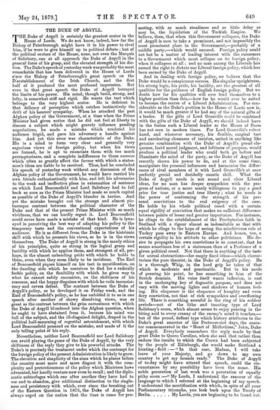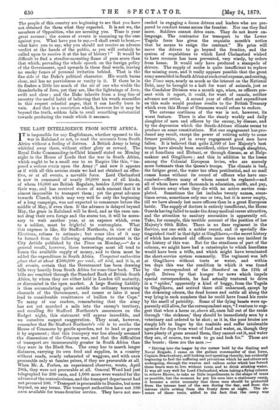THE DUKE OF ARGYLL.
THE Duke of Argyll is certainly the greatest orator in the House of Lords. We do not know, indeed, how far the Bishop of Peterborough might have it in his power to rival him, if he were to give himself up to political debate ; but of the political orators of the House, none, not even the Marquis of Salisbury, can at all approach the Duke of Argyll in the general force of his grasp, and the elevated strength of his dic- tion. The Duke's speech of yesterday week was probably the most remarkable that has been delivered in the House of Lords since the Bishop of Peterborough's great speech on the D:sestablishment of the Irish Church, and the first half of it produced the most profound impression. But even in that great speech the Duke of Argyll betrayed the limits of his power. His mind, though lucid, strong, and lofty, is somewhat stiff and rigid. He wants the tact which belongs to the very highest orator. He is deficient in that delicacy of perception which catches instinctively the drift of his hearers' sympathy. When he attacked the past Afghan policy of the Government, at a time when the Prime Minister had given notice that he did not feel at liberty to discuss a subject which might gravely influence pending negotiations, he made a mistake which rendered his audience frigid, and gave his adversary a handle against him. And yet this error was characteristic of the Duke. His is a mind to form very clear and generally very sagacious views of foreign policy, but when his views are formed, he is apt to enunciate them with too much peremptoriness, and a complete indifference to those nuances which often so greatly affect the favour with which a states- man's ideas are liable to be received. Thus, had he concluded his speech of yesterday week without any discussion of the Afghan policy of the Government, he would have carried his own friends enthusiastically with him, and left his adversaries to the weak and ineffective pleas in extenuation of sentence on which Lord Beaconsfield and Lord Salisbury had to fall back so soon as the Prime Minister had made as much capital as possible of the Duke of Argyll's blunder in tactics. And yet the mistake brought out the strange and almost pic- turesque contrast between the political character of the Duke and that of the present Prime Minister with so much vividness, that we can hardly regret it. Lord Beaconsfield could never have made a mistake of that kind. He is lynx- eyed in perceiving the best way of adapting his policy to the temporary taste and the conventional expectations of his audience. He is as different from the Duke in the histrionic skill with which he presents his views, as he is in the views themselves. The Duke of Argyll is strong in the manly ethics of his principles, quite as strong in the logical grasp and lucidity with which he applies them, and strongest of all, per- haps, in the almost unbending pride with which he holds to them, even when they seem likely to be invidious. The Earl of Beaconsfield piques himself on his tact in mystification, on the dazzling side which he contrives to find for a radically feeble policy, on the flexibility with which he gives way to what he cannot safely encounter, on the shiftiness of his resource, and the happy disguises with which he veils inconsist- ency and covers defeat. The contrast between the Duke of Argyll's .policy, as he developed it on Friday week, and the Earl of Beaconsfield's policy, as he has unfolded it to us in one speech after another of showy dissolving views, was as great as the contrast between the grim earnestness with which the Duke of Argyll blundered into the Afghan question, when he ought to have abstained from it, because his mind was full of the subject, and the ill-disguised delight, draped in the political half-mourning of regretful astonishment, with which Lord Beaconsfield pounced on the mistake, and made of it the only telling point of his reply.
Nevertheless, neither Lord Beaconsfield nor Lord Salisbury can avoid playing the game of the Duke of Argyll, by the very shiftiness of the reply they give to his powerful. attacks. The Duke's is precisely the treatment under which the contempt for the foreign policy of the present Administration is likely to grow. The elevation and simplicity of the aims which he places before the country must more and more disgust it with the com- plexity and pretentiousness of the policy which Ministers have advocated, but hardly venture now even to recall ; and the diplo- matic subterfuges which one after another they have had to use and to abandon, give additional distinction to the single- ness and persistency with which, ever since the breaking out of the Eastern Question in 1875, the Duke of Argyll has always urged on the nation that the time is come for pro- moting, with as much steadiness and as little delay as may be, the liquidation of the Turkish Empire. We believe, then, that when this Government collapses, the Duke of Argyll is sure to take a prominent, and not impossibly the most prominent place in the Government,—probably of a middle party,—which would succeed. Foreign policy could not but be a matter of leading interest with the successors to a Government which must collapse on its foreign policy, when it collapses at all ; and no man among the Liberals has earned the right to dictate our Liberal foreign policy, which has been earned by the Duke of Argyll.
And in dealing with foreign policy, we believe that the Duke would be a conspicuous success. His singular uprightness, his strong logic, his pride, his lucidity, are the greatest of all qualities for the guidance of English foreign policy. But we doubt how far his qualities will ever lend themselves to a higher position than this,—how far he would ever be suited to become the centre of a Liberal Administration. For con- siderable as the Duke's position in the House of Lords now is, it would be much greater if he had any of the natural gifts of a leader. If the gifts of Lord Granville could be combined with the gifts of the Duke of Argyll, we should indeed have in the fusion such a Liberal leader as the House of Peers has not seen in modern times. For Lord Granville's velvet hand, and wherever necessary, his flexible, surgical tact and unrelenting cleanness of incision, united in anything like genuine combination with the Duke of Argyll's proud elo- quence, lucid moral judgment, and loftiness of purpose, would produce a political leader who could both go before and illuminate the mind of the party, as the Duke of Argyll has recently shown his power to do, and at the same time, manipulate the personal influences and harmonise the differ- ences of rival members of it with Lord Granville's at once
perfectly genial and decidedly caustic skill. What the Duke of Argyll needs is not sound and clear Liberal ideas, for no man has deeper sympathies with the pro- gress of nations, or a more manly willingness to pay a good price for true justice and true liberty ; what he needs is the power of conforming the strength of his per- sonal convictions to the real exigency of the case. He holds by his whole political creed with a certain equal rigidity of conviction that makes no sufficient difference between points of lesser and greater importance. For instance, he clings to the establishment of the Presbyterian faith in Scotland with a rigour almost as indomitable as that with which he clings to the hope of seeing the mischievous rule of Turkey pass away in Eastern Europe. And hence, too, a certain rigidity in his attitude to other politicians. His de- sire to propagate his own convictions is so constant, that he seems sometimes less of a statesman than of a Professor of a given political creed. Not that there is anything of the taste for unreal abstractions—for empty fixed ideas—which charac- terises the pure theorist, in the Duke of Argyll's policy. He is a thorough Whig, in the hard grip he takes of that which is moderate and practicable. But in his mode of pressing his point, he has something in him of the
Scotch dominie. His voice itself wants inflexion, is cast in the unchanging key of dogmatic purpose, and does not vary with the moving lights and shadows of human feel- ing. His eloquence is the eloquence of haughty and even fiery conviction, not that of rich sympathies and overflowing life. There is something scornful in the ring of his noblest periods—not of the lithe and taunting type of Lord Salisbury's scorn, which almost seems to enjoy pouring in the biting acid to every cranny of the enemy's mind it touches,— but of the proud, defiant type which history attributes to the Duke's great ancestor of the Porteous-riot days, the ances- tor commemorated in the " Heart of Midlothian," John, Duke of Argyll. Everybody remembers the reply made by that great Duke to Queen Caroline, when she said that rather than endure the insults to which the Crown had been subjected by the people of Edinburgh, she would make Scotland a hunting - field : —" In that case, Madam, I will take leave of your Majesty, and go down to my own country to get my hounds ready." The Duke of Argyll of to-day might have uttered that speech, could the cir- cumstances by any possibility have been the same. His noble peroration of last week was a peroration of equally pithy scorn :—" My Lords, I understand the rancour of the language to which I referred at the beginning of my speech. I understand the mortification with which, in spite of all your Parliamentary triumphs, you look back upon the Treaty of
Berlin My Lords, you are beginning to be found out. The people of this country are beginning to see that you have not obtained for them what they expected. It is not we, the members of Opposition, who are accusing you. Time is your great accuser ; the course of events is summing up the case against you. 'What have you to say,—I shall await to hear,— what have you to say, why you should not receive an adverse verdict at the hands of the public, as you will certainly be called upon to receive it at the bar of history ? " It would be difficult to find a steadier-motmting flame of pure scorn than that which, pervading the whole speech on the foreign policy of the Government, sped upwards in these final words, leaving no smoky fumes of personal irritation behind. That is the fine side of the Duke's political character. His wrath burns clear, and has no peevishness or vanity in it. If there be in its flashes a little too much of the air of one who wields the thunderbolts of Jove, yet they are, like the lightnings of Jove, swift and clear ; and the Duke inherits from a long line of ancestry the useful habit of believing that his wrath resembles in this respect celestial anger, that it can hardly burn in vain. And that is a conviction which, however far it may be beyond the truth, seldom fails to avail something substantial towards producing the result which it assumes.



































 Previous page
Previous page